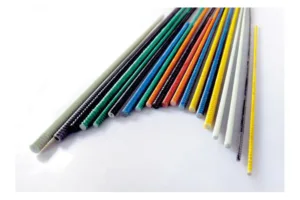Fiberglass reinforced plastic (FRP) products have gained significant traction in various industries due to their durability, corrosion resistance, and lightweight nature. Among the diverse applications of FRP, fiberglass rebar stands out as a crucial component in construction projects. To ensure the efficient production of high-quality fiberglass rebar, manufacturers need to adopt optimized processes. In this article, Unicomposite composite profiles will delve into seven essential tips that can help you streamline and enhance your fiberglass rebar production process.

fiberglass rebar production
1. Introduction
Fiberglass rebar has revolutionized the construction industry by offering superior strength and resistance compared to traditional steel rebar. Optimizing the production process for fiberglass rebar can lead to improved product quality, reduced costs, and increased customer satisfaction.
2. Invest in Advanced Equipment and Technology
To enhance your fiberglass rebar production process, it’s essential to invest in cutting-edge equipment and technology. Advanced pultrusion machines and automation systems can significantly increase production efficiency and reduce human error. Integrating computer-aided design (CAD) software allows for precise customization of rebar profiles, catering to specific project requirements.
3. Quality Raw Materials Make the Difference
The quality of your fiberglass rebar hinges on the materials used. Ensure that you source high-quality fiberglass strands and resin. Conduct thorough research on suppliers and opt for those with a proven track record of delivering premium materials. The right combination of fiberglass and resin is pivotal for achieving the desired mechanical properties and longevity of the rebar.
4. Implement Robust Quality Control Measures
Maintaining consistent product quality requires a robust quality control process. Establish quality checkpoints at various stages of production to identify and rectify any issues promptly. Regular inspections, material testing, and dimensional accuracy checks are essential to ensure that the final product meets industry standards and client expectations.
5. Focus on Skilled Workforce Training
Even with advanced technology, skilled personnel play a critical role in the production process. Provide comprehensive training to your workforce on operating machinery, following protocols, and adhering to safety guidelines. A knowledgeable and well-trained team can contribute to higher production efficiency and fewer errors.
6. Embrace Sustainable Practices
Sustainability is a growing concern in every industry. Implement eco-friendly practices in your production process by using recyclable materials, minimizing waste, and optimizing energy consumption. Not only does this contribute to environmental conservation, but it also enhances your brand’s reputation as a responsible manufacturer.
7. Continuous Process Improvement
The quest for optimization is ongoing. Regularly assess your production process, gather data on key performance indicators, and identify areas for improvement. Encourage feedback from your team and incorporate their insights. By fostering a culture of continuous improvement, you can adapt to changing market demands and stay ahead of the competition.
Conclusion
Efficient fiberglass rebar production is vital for delivering high-quality materials to construction projects. By investing in technology, sourcing quality materials, focusing on quality control, training your workforce, embracing sustainability, and striving for continuous improvement, you can optimize your production process and contribute to the advancement of the construction industry.
Frequently Asked Questions
- What is fiberglass rebar? Fiberglass rebar is a reinforcement material used in construction, offering enhanced strength and corrosion resistance compared to traditional steel rebar.
- Why is quality control important in fiberglass rebar production? Quality control ensures that the produced fiberglass rebar meets industry standards, ensuring safety and reliability in construction projects.
- How does sustainability benefit fiberglass rebar production? Embracing sustainable practices reduces environmental impact, enhances brand reputation, and aligns with modern eco-conscious consumer preferences.
- Why is continuous improvement crucial in production processes? Continuous improvement allows manufacturers to adapt to changing market dynamics, enhance efficiency, and maintain a competitive edge.
- Where can I learn more about Unicomposite’s fiberglass products? Access Now: https://bit.ly/J_Umma
 info@unicomposite.com
info@unicomposite.com


























